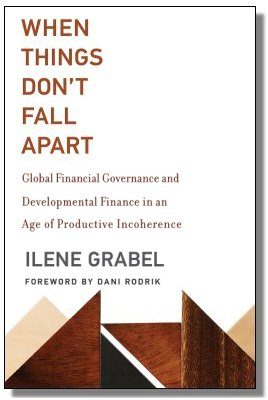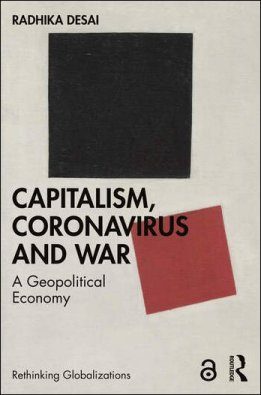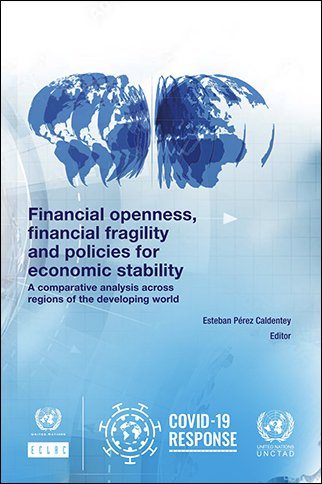Publisher: Third World Network Year: 2023 No. of pages: 42 Download now About the Book…
When Things Don’t Fall Apart Global Financial Governance and Developmental Finance in an Age of Productive Incoherence

Author: Ilene Grabel
Foreword by Dani Rodrik
Publisher: The MIT Press
ISBN: 9780262037259
About the Book
In When Things Don’t Fall Apart, Ilene Grabel challenges the dominant view that the global financial crisis had little effect on global financial governance and developmental finance. Most observers discount all but grand, systemic ruptures in institutions and policy. Grabel argues instead that the global crisis induced inconsistent and ad hoc discontinuities in global financial governance and developmental finance that are now having profound effects on emerging market and developing economies. Grabel’s chief normative claim is that the resulting incoherence in global financial governance is productive rather than debilitating. In the age of productive incoherence, a more complex, dense, fragmented, and pluripolar form of global financial governance is expanding possibilities for policy and institutional experimentation, policy space for economic and human development, financial stability and resilience, and financial inclusion. Grabel draws on key theoretical commitments of Albert Hirschman to cement the case for the productivity of incoherence. Inspired by Hirschman, Grabel demonstrates that meaningful change often emerges from disconnected, erratic, experimental, and inconsistent adjustments in institutions and policies as actors pragmatically manage in an evolving world.
Grabel substantiates her claims with empirically rich case studies that explore the effects of recent crises on networks of financial governance (such as the G-20); transformations within the IMF; institutional innovations in liquidity support and project finance from the national to the transregional levels; and the “rebranding” of capital controls. Grabel concludes with a careful examination of the opportunities and risks associated with the evolutionary transformations underway.
Discount
Friends and colleagues can receive a 30% discount when ordering it directly through the MIT Press website (https://mitpress.mit.edu/grabel) until 4/1/18 ($24.50). Use discount code MGRABEL30 when prompted during checkout. This code can be used more than once, for multiple copies, and for both print and MIT Press e-editions.
About the Author
Ilene Grabel is Professor of International Finance at the Josef Korbel School of International Studies at the University of Denver.
Endorsements
“This clear and passionate argument that ‘productive incoherence’ is transforming the global financial system challenges believers in all kinds of ‘isms’—and provides a source of optimism in otherwise dark times.”
—Jayati Ghosh, Professor of Economics, Jawaharlal Nehru University, New Delhi; Executive Secretary, International Development Economics Associates
“How do you know a change when you see it? We like to see big bangs that lead to big changes. But life moves in increments. Recognizing this, Ilene Grabel has produced a lens for us that sees incoherence and discontinuity, not as noise, but as signal. And as evidence that when agents make changes to their institutional context locally, they effect changes that matter globally. Grabel shows us why institutional and ideational incoherence is the raw material of change.”
—Mark Blyth, Eastman Professor of Political Economy, The Watson Institute for International and Public Affairs, Brown University
“This book, by a leading critical thinker on the global financial system, analyzes with outstanding creativity the evolution of the system since the East Asian crisis. It shows in a very innovative way how it has become a more complex and fragmented system, but one that has enhanced the voice and policy space of emerging and developing countries. It is a must read for those who work on international finance.”
—José Antonio Ocampo, codirector of Banco de la República de Colombia; Professor, Columbia University; former United Nations Under-Secretary-General; former Finance Minister of Colombia
“Albert Hirschman’s pathbreaking insights into the processes of socio-economic change have been forgotten as mainstream social scientists have become less apt to question the status quo and dismissive of the possibilities for social transformation. Ilene Grabel makes a powerful and fresh case for the ‘Hirschmanian mindset’ as an essential lens through which we can understand evolutions in global financial governance since the East Asian crisis of 1997 and especially following the global financial crisis.”
—Ha-Joon Chang, University of Cambridge; author of 23 Things They Don’t Tell You about Capitalism



